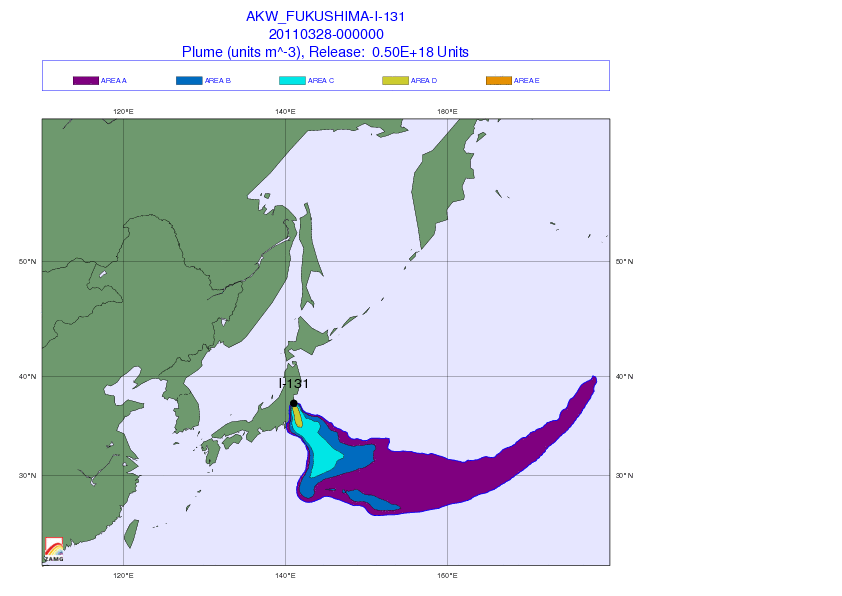Japan nuclear: Workers evacuated as radiation soars
<includes video report>
Radioactivity in water at reactor 2 at the quake-damaged Fukushima nuclear plant has reached 10 million times the usual level, company officials say.
Workers trying to cool the reactor core to avoid a meltdown have been evacuated.
Earlier, Japan's nuclear agency said that levels of radioactive iodine in the sea near the plant had risen to 1,850 times the usual level.
The UN's nuclear agency has warned the crisis could go on for months.
It is believed the radiation at Fukushima is coming from one of the reactors, but a specific leak has not been identified.
Leaking water at reactor 2 has been measured at 1,000 millisieverts/hour - 10 million times higher than when the plant is operating normally.
"We are examining the cause of this, but no work is being done there because of the high level of radiation," said a spokesman for the plant's operator Tokyo Electric Power Co (Tepco).
"High levels of caesium and other substances are being detected, which usually should not be found in reactor water. There is a high possibility that fuel rods are being damaged," the spokesman added.
Tepco has been criticised for a lack of transparency and failing to provide information more promptly.
The nation's nuclear agency said the operator of the Fukushima plant had made a number of mistakes, including worker clothing.
Meanwhile, the Japanese government said that airbone radiation around the plant was decreasing.
The plant was damaged in the deadly 11 March earthquake and tsunami.
The death toll has now passed 10,000, and more than 17,440 people are missing.
The UN nuclear watchdog, the International Atomic Energy Agency (IAEA), has now sent extra teams to the Japanese nuclear plant.
The radiation found in the sea will no longer be a risk after eight days because of iodine's half-life, officials say.
Fresh water
Japanese government spokesman Yukio Edano said on Saturday that Tepco had to be more transparent in the wake of an incident this week in which three workers were exposed to radiation levels 10,000 times higher than normal, suffering burns.
"We strongly urge Tepco to provide information to the government more promptly," Mr Edano said.
Hidehiko Nishiyama, a spokesman for Japan's Nuclear and Industrial Safety Agency (Nisa), said two injured workers were wearing boots that only came up to their ankles and afforded little protection.
"Regardless of whether there was an awareness of high radioactivity in the stagnant water, there were problems in the way work was conducted," Mr Nishiyama said.
He said Tepco also knew of high air radiation at one reactor several days before the incident at the Fukushima Daiichi plant 240km (150 miles) north of Tokyo.
He said Tepco had been warned and measures to improve safety had been put in place.
He said that leakage from reactors had probably caused the high levels of radiation found in water at the Fukushima plant.
Emergency workers are continuing to cool the reactors in an effort to prevent a meltdown. They have now switched to using more favoured fresh water as a coolant, rather than sea water.
There had been fears the salt in sea water could further corrode machinery. The fresh water is being pumped in so that contaminated radioactive water can be extracted.
The team of more than 700 engineers has found radioactive water in three of the six reactors.
Four of the reactors are still considered volatile.
The US 7th Fleet is sending barges loaded with 500,000 gallons of fresh water.
Mr Edano said: "We seem to be keeping the situation from turning worse. But we still cannot be optimistic."
Iodine
Mr Amano told the New York Times that Japan was "still far from the end of the accident".
Although he saw some "positive signs", particularly the restoration of electric power, he said: "More efforts should be done to put an end to the accident."
His main fears were that the lack of coolant would mean spent fuel rods would remain exposed to the air, and then heat up, releasing radioactive material.
China, Singapore, Hong Kong and other Asian importers have banned some imports of vegetables, seafood and milk products for fear of contamination.
Australia, the European Union, the United States and Russia have followed suit.
http://www.bbc.co.uk/news/world-asia-pacific-12872707 



